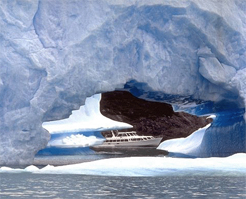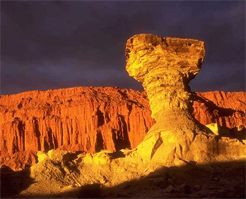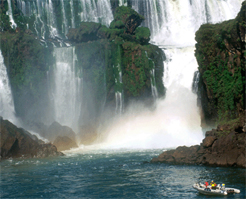Argentina Travel Guide



Telephone:
E:
Argentina
Argentina, the second largest country in South America, is a vast and diverse nation known best for its romantic Tango and political heroine Eva Peron. The country’s capital, Buenos Aires, is one of the world’s most sophisticated cities with excellent theatre and art, fine restaurants and wide, elegant boulevards that give the city a decidedly European feel. Across the rest of the country, natural beauty and charming local customs give Argentina a flair of its own. From mile-long Iguazu Falls in the northeast, to the glaciers and abundant marine life of Patagonia in the south. Argentina is a journey of unique experiences.
Area
2.8 million square metres (1.08 million square miles) - 3,700 km from Tropical Jungle to Antarctic ice. - 1,700 km from east to west. (Second largest country in South America after Brazil)
Buses
Argentina boasts an outstanding short and long-distance bus network. Since regional train service is limited and plane tickets can be expensive, bus travel is the alternative to travel from city to city within Argentina or even to neighbouring countries. The hub of this network is Buenos Aires' Terminal de Omnibus de Retiro; Keep in mind that distances are considerable and thus bus travel can be very time consuming!
Car Rental
Mayor international agencies and local agencies located in the main cities offer different car categories and a valid license (in a Roman alphabet language) is sufficient to rent a car. Almost all cars for rent are manual transition cars. Besides a driver’s licence guests (who must be above 21 years old) are required a passports and a credit card.
Climate
The country’s territory offers a wide variety of climates, subtropical in the North, sub-Antarctic in the southern Patagonia, and mild and humid in the Pampa plains. Media temperature from November to March is 23°C, and 12°C from June to September.
Cruise Ships
Several International Companies visit the Argentine shores stopping at the capital city of Buenos Aires and usually continuing to Mar del Plata, south of Buenos Aires and then docking at the ports of Puerto Madryn and Ushuaia. There are also short cruises in Southern Patagonia that sail the glaciers in El Calafate or visit far-away lands and even stop at the mythical Cape Horn. The country offers a wide array of shore excursions for cruise travellers.
Customs & Immigration
At the airport visitors will have their passport and visa (if required) checked. The International Airport in Buenos Aires has separate lines on arrival for Argentine passport holders and foreign visitors.
Diving
Diving in Argentina is only for those who do not mind cold waters (6 oC to 18). Dry suits are needed! The location for diving is the Valdes Península. The area is home to dolphins and whales, elephant seals, seal lions and penguins, which may be spotted and observed from a distance,
Dress
Argentines are sociable, friendly and always interested in meeting foreigners. They are tactile and physically demonstrative. Most exchange kisses (usually a single cheek-to-cheek kiss) on first meeting both men and women. Argentines are well presented. Dress code is casual smart.
Drink
The legal age to purchase alcoholic beverages in Argentina is 18. Wine, beer, gin and whiskey are common drinks in the country which is well known for its production of Malbec Wine in the province of Mendoza. Buenos Aires is specially known for its traditional coffee stores! You can stop for coffee or tea everywhere in the city! "Mate" (pronounced mah-tay) is a traditional drink in Argentina made using the dried leaves of a plant grown in the Northeast. It is then soaked in hot water to release the flavor and it is drunk from a pumpkin gourd through a bombilla (a long metal straw).
Eating Out
Buenos Aires easily holds its own with the top gourmet capitals of the world, catering to all tastes and cultures, although without a doubt its forte is traditional Argentine fare: exquisite tender beef, lamb or pork and superb pasta. Restaurants have different opening times please note, however, that most restaurants open for dinner as from 8.00 pm.
Electrical Current
It runs on 220 volts. Power outlets are either two or three pronged (European style plugs). We recommend you bring an adapter with these plugs
Guide Books
Most of the major guidebook series publish titles that cover Brazil. Many also produce a separate guide for Buenos Aires and for Patagonia (southern Argentine & Chile)
Health & Insurance
Argentina has excellent private hospitals in the capital city of Buenos Aires. Other mayor cities also have private hospitals. Private medical care is expensive; international medical & travel insurance is recommended.
LANGUAGE
Spanish is the official language
MEDIA
The Buenos Aires Herald is an English language daily newspaper printed and sold in Buenos Aires. Foreign newspapers and magazines are easy to find in Buenos Aires. Hotels have satellite or cable television offering international movie, sports and news channels including CNN and BBC.
MONEY
The official Argentine currency is the Peso.
Banks & Credit Cards
ATM (Automatic Teller Machines) availability is generally good but you should not rely solely on using international debit cards bearing the Cirrus or Visa logos to access funds (in Argentine Pesos).
IMPORTANT: In many cases your card is returned at the end of the transaction. DO NOT FORGET IT.
CREDIT CARDS: VISA, AMEX and MASTERCARD are accepted in most hotels and mayor shops and restaurants. Shops sometimes charge extra for the usage of the card or give important discounts for paying in cash.
Lost/stolen credit cards: American Express (011 4310-3000or 0-800-444-2450) – MasterCard (0800 555 0507) - Visa (4379-3333 or +1 410 581 0120)
TRAVELLERS CHEQUES are accepted at most hotels, Banks and exchange houses (Casas de Cambio).
CASH: US dollars / EUROS are not widely accepted outside the major tourist areas for cash transactions but it is worth bringing a small supply of dollars (small denominations) to exchange for pesos. Other currencies are not accepted except at some banks and exchange houses.
BANKS are normally open in the mayor cities from 10.00 am to 3.00 pm. In smaller towns banks open at 7.00/8.00 am and close at 1.00 pm. Banks are closed on week-ends and holidays.
CURRENCY EXCHANGE (Casa de Cambio). When exchanging money, you are advised to use only authorised bureaux de change, rather than informal traders.
Population
Argentina’s current population is 40 million inhabitants. Most Argentines are of European origin, especially Spanish and Italian. Buenos Aires (population 3.04 million; approx. 12 million live in the greater Buenos Aires metropolitan area)
Public Holidays
• January 1st New Year
• Feb/March: Carnival – Monday & Tuesday*
• March 24: Day of Remembrance for Truth and Justice***
• March/April: Easter – Good Friday*
• April 2: Veteran’s Day and tribute to the fallen in the Malvinas War***
• May 1: Labour Day***
• May 25: Anniversary of the First National Government***
• June 20: National Flag Day***
• July 9: National Independence Day***
• August 17: Anniversary of the death of General José de San Martín (Holiday effective the third Monday of August)
• October 12: Day of Respect to Cultural Diversity (Holiday effective the second Monday of October)
• November 20: Day of National Sovereignty (Holiday effective the fourth Monday of November)
• December 8: Immaculate Conception Day***
• December 25: Christmas Day***
* Floating Day.
** If the date is a Tuesday or Wednesday, the holiday will be effective on the preceding Monday; if it is on a Thursday or Friday, the holiday will be effective the following Monday.
*** Touristic holiday bridge: If the date of a non-movable holiday is on a Tuesday or Thursday, an extra holiday can be added on the previous Monday or the following Friday, respectively. This can be made effective only twice a year and is decided by government authorities 50 days prior to the beginning of each calendar year.
Railways
The passenger rail network in Argentina is very limited and not a viable option for travelling around the country. There are, however, a few special “tourist” routes including the Coastal Train Ride in the Northern suburbs of Buenos Aires, the old Patagonian Express “La Trochita” in the south and the Train to the Clouds, an amazing railway in the Northwest that reaches 4,200 meters above sea level.
Taxis
CABS/TAXIS are plentiful and inexpensive. It is advisable to always take a ‘radio taxi’. Fares are metered and you pay what is shown on the meter (a small tip is custom).
Telephone Services
Available 24 hours: Police 911 – Fire 100 – Ambulance 107.
Tourist Police Station: (24 hours with English speaking assistance) Tel: 0800 999 5000 or 4346 5748.
Embassies: (located in Buenos Aires) Canada: Tagle 2828 – Tel.: 011 4808 1000
United Kingdom: Dr. Luis Agote 2312 – Tel.: 011 4808 2200
United States of America: Av. Colombia 4300 – Tel.: 011 5777 4533
Avoid calling from your hotel. Rates are a lot higher than pay phones.
Pay phones work with cards that may be purchased in kiosks and telephone companies’ offices or with legal tender coins. There are also stores with pay phones (open 24 hours a day) where you can pay in cash. (LOCUTORIOS)- These stores also have internet facilities.
Calling to Argentina from abroad, dial the country code (54) and then the area code of the place you want to call. If calling an Argentine mobile phone the country code is (549). For domestic calls, dial 0 before the area code. For international calls, dial 00, the country code and city code.
Mobile phones: There are three networks (GSM, AMPS/TDMA800 and CDMA800) in use. Roaming with your own mobile is not always possible across the country. It is easy to rent locally. A local supplier is www.altel.com.ar who does not charge for rental.
Time
Argentina is three hours behind Greenwich Mean Time. Day saving time (DST) adjustments is not currently in practice but provinces are entitled to make DST adjustments effective independently.
Vaccinations
Argentina requires no vaccinations to enter the country except for cholera and yellow fever for passengers coming from countries where those diseases are endemic. Health wise, Argentina is a relatively safe country to visit that has similar levels of sanitation/hygiene to European destinations.
Visas
No tourist visa is required for visiting the country for up to 90 days, for citizens from: The European Union, the United States of America and the following Latin American countries: Bolivia, Brazil, Chile, Paraguay, Uruguay, Colombia, Costa Rica, Dominican Republic, Ecuador, El Salvador, Guatemala, Honduras, Mexico, Nicaragua, Panamá, Peru and Venezuela. The maximum stay granted by the consular offices is ninety (90) days that can be extended another ninety days by the National Immigration Office (fees apply).
U.S., Canadian and Australian Citizens are required to pay and entrance fee on arrival in Argentina. At the moment this fee is only collected at the International Airport of EZEIZA (EZE). The cost of the fee is equal to the visa fee charged to Argentine Citizens travelling to these countries. Currently the cost is USD 140 for the US citizens, USD 100 for Canadian citizens and USD 70 for Australian citizens. These costs are subject to change.
